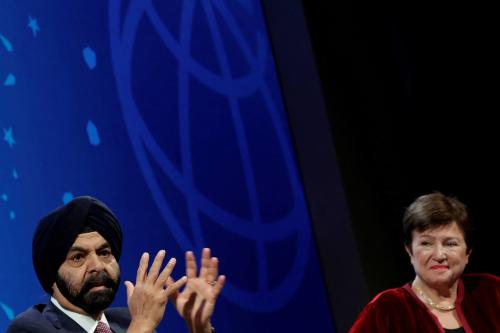Robert Zoellick’s five-year term as president of the World Bank ends next year on June 30. Selecting someone to replace him will be one of the biggest global governance issues in 2012.
The U.S. position on this issue is key, because every president of the World Bank since it was established in 1945 has been an American. This practice is half of a deal made when the International Monetary Fund (IMF) and World Bank were founded — the other half called for every leader of the IMF to be a European.
As rising powers like Brazil, China, India, and other emerging market countries have advanced economically, they have challenged this leadership deal with increasing fervor. We are now at a point where substantial amounts of political capital must be spent to ensure that American and European candidates continue to monopolize these positions, and each successful replacement engenders more resentment in the rest of the world.
The force of this issue was seen earlier this summer when the managing director of the IMF, Dominque Strauss-Kahn, resigned in response to a sex scandal. The Europeans immediately waged a full court press to have French Finance Minister Christine Lagarde appointed as his successor. Most development assistance experts in the economically advanced countries joined with the governments of emerging market countries in favor of appointing a non-European. A highly qualified candidate from Mexico, Agustin Carstens, was formally nominated, but the vote in the Executive Board of the IMF was overwhelmingly in favor of Lagarde. This occurred, in large part, because the 27 member countries of the European Union hold 28 percent of the votes, but also because the emerging market countries failed to rally behind Carstens — seemingly for narrow political reasons.
Following long-established practice, President Obama will be expected either to endorse Robert Zoellick for a second five-year term or nominate a replacement. Unless the emerging market countries can quickly unite behind a single candidate, Obama’s choice is likely to prevail, but at a cost in two forms. First, respect for the United States as a “responsible stakeholder” in the global system will diminish (borrowing the phrase coined by Zoellick for China several years ago). Second, political and financial support for the World Bank from other countries will slacken, which will make the Bank less effective in meeting the global challenges of poverty, conflict, and climate change.
Zoellick has a decent record as president of the World Bank, especially in repairing the damage done by his predecessor, Paul Wolfowitz, who was forced to resign as a result of several missteps including his relationship with a female member of the Bank’s staff. Nevertheless, if President Obama were in a strong political position, he certainly would not propose Zoellick for a second term, as Zoellick was nominated for the World Bank presidency in 2007 by George W. Bush after being a key operative in three Republic administrations.
Now Obama is in a lose-lose-lose position. He might use the reappointment of Zoellick as a bargaining chip with the Republicans in Congress, but it would cost him support in the Democratic Party. He could nominate a Democrat with political experience comparable to Zoellick’s, but he would pay some price from Republicans whose support he needs in Congress. He would probably be viciously attacked by partisans in both parties, if he opts for an open selection process that culminates in the appointment of the first non-American president of the World Bank—even though this outcome is arguably in the long-term interest of the United States.
One way of avoiding this trilemma is a one-year extension of Zoellick’s presidency. This option might be well received by the international community, would prefer not to see this position become part of an American game of political football. If Zoellick were to decline the offer, one of the three managing directors of the World Bank might become the acting president. They are Sri Mulyani Indrawati from Indonesia, Mahmoud Moheildin from Egypt, and Caroline Anstey from the United Kingdom.
If Americans on both sides of the political spectrum pulled together to maintain the leadership position of the United States in global affairs, they would see the benefits that could be gained by having Barack Obama take the bold step of throwing open the position of World Bank president to candidates of all nationalities. He could then nominate an outstanding American—a Republican even—who might be more widely supported than the non-Americans who may be nominated.
Let’s hope that Obama does not feel forced to use the World Bank presidency as a bargaining chip with the Congress. It would be the worst possible outcome for the United States in the long run. As is so often the case, the best outcome seems to be politically infeasible. Second best, in this case, would be an open process with an American nominee who prevails in the absence of an emerging market nominee able to command broad support among the other 186 member countries.



Commentary
New World Bank President? Another Tough Choice for Obama
September 20, 2011